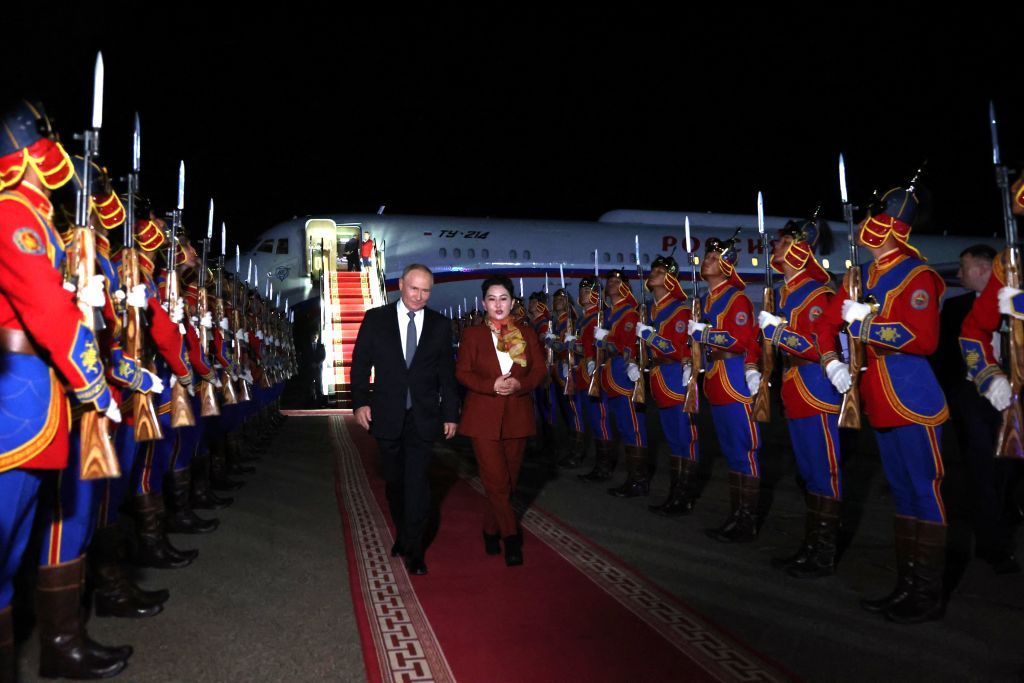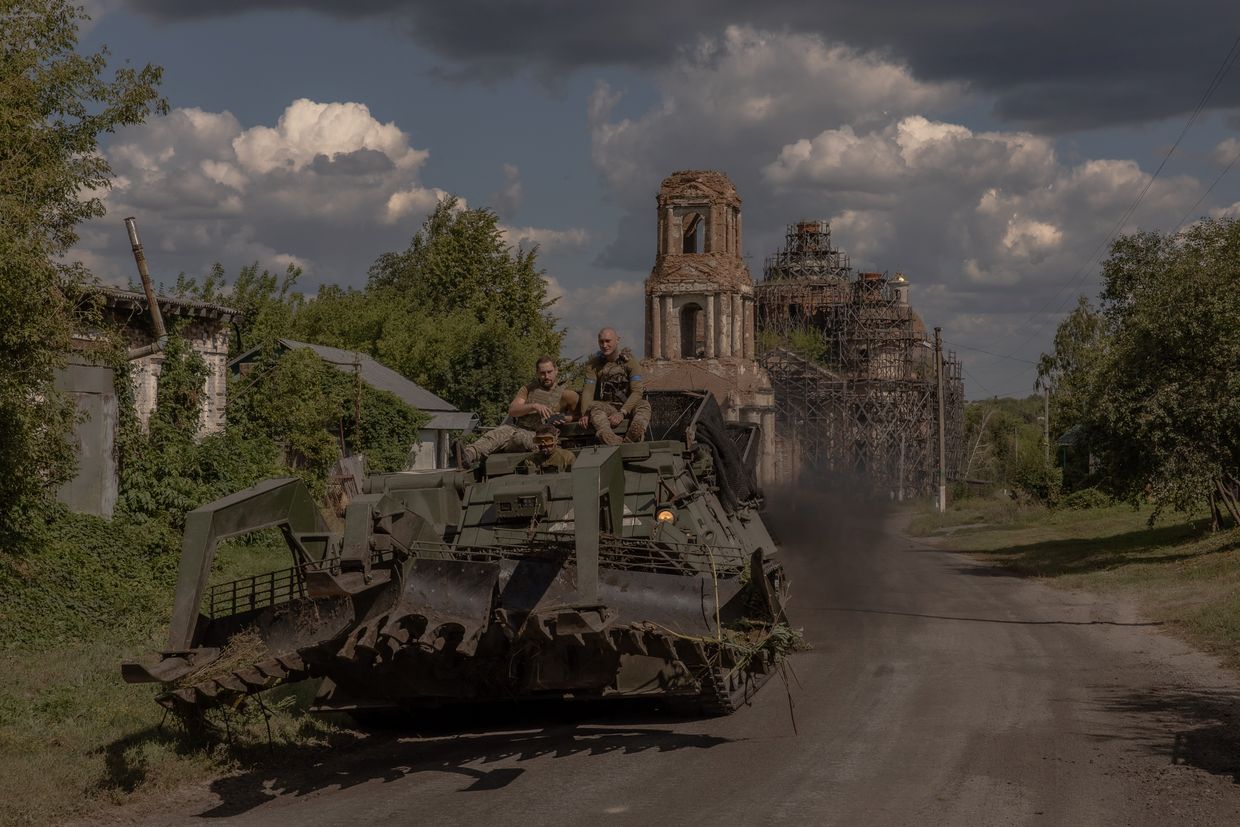Opinion: Downing missiles while leaving launchers intact is like swatting mosquitos without closing the window

A Ukrainian solider watches a multiple rocket launcher system firing a rocket at Russian positions on the front line in eastern Ukraine on Nov. 29, 2022, amid the Russian invasion of Ukraine. (Anatolii Stepanov/AFP via Getty Images)

Isaac C. Flanagan
Co-founder of Zero Line
The greatest risk facing Ukraine and the West today isn’t the nuclear war predicted by headlines. Instead, the real dangers are Ukraine’s humanitarian crisis, the influx of refugees, the spread of nuclear weapons, the risk of a larger European war, state-sponsored terror, and disinformation. Most concerning is the potential collapse of trust in America and its allies – a trust that is eroding as we retreat from ineffective threats.
Our fear of unlikely outcomes is allowing genuine perils to fester. This fear, disguised as prudence, feeds the very risks we aim to avoid. Consider current U.S. policy: protecting Russian launch facilities under the belief that it prevents escalation. In reality, this policy restrains Ukraine while Russia attacks at will. Rather than preventing conflict, it prolongs it and risks undermining the global stability we seek to protect.
On Aug. 26, Russia launched the largest missile and drone attacks on Ukrainian infrastructure of the entire war. With 127 cruise missiles and 109 Shahed drones targeting 15 of Ukraine’s 24 regions, Ukraine intercepted most, but many still hit vital infrastructure and population centers.
The Kyiv Hydroelectric Power Plant and energy grids nationwide are not just targets; they are Ukraine’s lifelines. Each hit plunges millions into darkness, worsening their suffering. While Ukraine shows extraordinary resolve, the West remains paralyzed by outdated doctrine that no longer protects us – only Russia. This paralysis not only prolongs the conflict but also weakens global norms against aggression.
Considering this, it’s critical to recognize Russian President Vladimir Putin’s diminishing approval ratings at home. The Ukrainian incursion into Kursk has not only claimed over 1,000 square kilometers of Russian territory but has also left many Russians feeling abandoned by their own government. It’s time to press our advantage. Putin is weakened and vulnerable – an opportunity we must not squander.
Yet, we’ve done nothing but limit Ukraine’s capacity to fight back, prolonging this war. For every missile Ukraine intercepts, Russia launches dozens more. As Ukraine repairs one power grid, Russia destroys another. Over 200 military targets within Russia are within range of U.S.-provided ATACMS missiles, but U.S. policy prohibits Ukraine from striking these key installations.
As six former generals, ambassadors, and cabinet deputies stated in an Aug. 16 letter to U.S President Joe Biden, “Victory means taking out the archer, not defending indefinitely against his arrows.” Former Secretary of State Mike Pompeo echoed these sentiments, criticizing the White House for “consistently setting red lines for our Ukrainian ally” and for having “restricted weapons deliveries out of fear of Putin. But for this weakness, the war could have ended by now.”
"Victory means taking out the archer, not defending indefinitely against his arrows."
It’s far cheaper to destroy launchers than to keep intercepting missiles and rebuilding infrastructure. Shooting down missiles while leaving launchers intact is like swatting mosquitos without closing the window. You might kill a few, but the swarm will keep coming. The proper solution is to close the window – cut off the source – so you’re not endlessly responding to a problem you could have easily prevented. Closing that window means eliminating Russia’s launch sites before more destruction rains down.
We’re investing heavily in expensive defenses while preventing these attacks at their source would be far less costly – not to mention the priceless lives saved by every missile that never hits a hospital or school. The strategy of catching up to Russia’s next move, rather than preempting it, has been a costly failure with far-reaching consequences beyond Ukraine’s borders. Each failure to act now increases the risk of future conflicts.
Meanwhile, Russia celebrates every missile salvo as a victory. Its pundits cheer every strike, calling for more devastation. Every time we prevent Ukraine from retaliating, we further encourage Moscow. The Kremlin is gambling that the West will continue to tie Ukraine’s hands while it “stands with them for as long as it takes”—and we need to tilt the odds back in our favor.

While Russia’s missiles are destroying cities, it is also waging a parallel war of state-sponsored terror and disinformation. These tactics are not only destabilizing Ukraine but also part of a broader campaign to undermine the very fabric of Western democracies. Russia’s cyberattacks, disinformation campaigns, and covert actions are creating instability across borders, while the fear of escalation keeps us frozen in inaction. Left unchecked, this erosion of stability will ripple through the international system, weakening the structures that have maintained peace and security for decades.
But for me – and for the thousands of other patriotic Americans who have chosen to live in Ukraine and support both Ukrainian independence and American national security priorities – this isn’t just an abstract debate about risk; it’s concrete and consequential.
We face the immediate consequences of our government’s hesitation – whether it’s another missile barrage that knocks out power to entire cities, another attack that destroys vital infrastructure, or the death of a friend, journalist, medic, or volunteer on the front lines or in an attack on a hotel. Meanwhile, the West looks on with timid reluctance.
Verbal condemnations, no matter how strong, signal that Ukraine’s allies prefer words to action. The correct response to the record-breaking attack last week is to provide Ukraine with all the weapons and equipment that we or our allies will never use (saving us the cost of storing and decommissioning them) and to remove all restrictions on Ukraine’s use of them (except those imposed by the laws of war).
Ukraine has demonstrated its ability to fight and win. It has developed technological and other capabilities that even its allies lack, often exceeding expectations on the battlefield despite limitations that NATO allies would never face, such as insufficient air power. Despite these constraints, Ukraine has innovated and used its resources efficiently and creatively to achieve significant victories.
Of course, some argue that allowing Ukraine to attack Russian territory risks a nuclear confrontation. But this fear misunderstands the dynamics at play. Russia has been threatening nuclear escalation since the war began, but what we’ve seen is that when faced with firm and decisive action, Moscow recalibrates rather than escalates. Putin is rational about preserving his power and knows that any use of nuclear weapons would have catastrophic consequences for Russia itself. Western timidity is more likely to encourage further Russian aggression, as Putin interprets our caution as weakness.
There is also a greater risk that critics of escalation overlook: the danger of nuclear proliferation. If the West allows Russia to win this war through nuclear blackmail, it will set a dangerous precedent. Countries like Iran, North Korea, and China will take note and realize that possessing nuclear weapons gives them a blank check to commit acts of aggression with impunity. Autocrats around the world would learn that nuclear coercion is a powerful tool to achieve their goals. By failing to stand firm against Russia, we risk triggering a domino effect in which more nations pursue nuclear weapons, destabilizing global security for decades. Thus, far from preventing a nuclear catastrophe, our hesitation could lay the groundwork for many future crises. The stakes are clear: inaction now risks a far more dangerous and unstable world in the future.
The recent missile attack on Kyiv should serve as a wake-up call: Russia will only stop when we force them to. The dangers we face—whether humanitarian disasters, nuclear proliferation, or state-sponsored terror—are real and present. The failure to punish Russia for destroying the Nova Kakhovka dam sent a clear signal: Russia can attack the Kyiv Hydroelectric Power Plant without consequence. And when Russian drones violate NATO airspace without penalty, China gets the message that it can do the same over Taiwan. The consequences of our inaction will extend far beyond Ukraine’s borders.
The U.S., EU, and UK have allocated $97.3 billion in military aid to Ukraine, but that represents just 0.086% of their combined GDP annually—pocket change for the future of democracy. But military aid alone is not enough. We need a muscular new strategy, one that acknowledges Ukraine’s need to fully defend itself, including striking targets deep inside Russia. For pennies on the dollar, we can now secure the global order and send our adversaries running. Spend the money now to fully empower Ukraine or risk spending much more—and potentially risking the lives of our own soldiers – later.
Policymakers must recognize that defeating Russia is not only possible but critical to the security and integrity of the global order. Victory in Ukraine isn’t just about winning this war—it’s about securing peace, stability, and confidence in the U.S.-led alliance. We cannot afford to continue to walk past real threats while hiding in the shadows of unlikely disasters. It’s time to act boldly, put aside our fears, and give Ukraine everything it needs to win—lest the risks we ignore today become the crises of tomorrow.
Editor’s Note: The opinions expressed in the op-ed section are those of the authors and do not purport to reflect the views of the Kyiv Independent.










